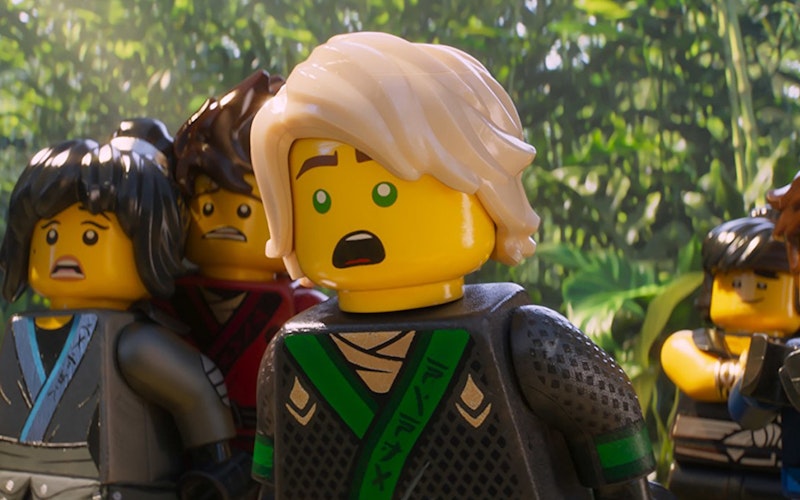
Movies
Imagining Faithfulness with The Lego Ninjago Movie
Ninjago hits something of a sweet spot for me. First, it’s a line of Legos, and as a child I devoted a lot of space on annual Christmas lists to Legos, so there’s a tactile nostalgia. Second, my oldest son loves the world of Lego Ninjago and has taught my youngest son to love it, and I love them. So there I sat in the theater for The Lego Ninjago Movie, expecting little more than cool visuals, a few jokes for the parents, and madcap action. Imagine my surprise when a line of dialogue at the end—“Dad, are you crying?”—felt like it was directed at me.
For the uninitiated, Ninjago City is a seaside town teeming with zany Lego people. Everything, however, is not awesome. (Spoilers ahead.) Mostly this is because there’s a four-armed warlord named Garmadon (voiced by Justin Theroux) whose army regularly raids the city. One of Ninjago’s teenagers happens to be Lloyd Garmadon (Dave Franco), the estranged son of the villain, which has made him something of a pariah in town. Lloyd lives with his mom, Koko (Olivia Munn). She loves him, but can't compensate for the wound created by his father’s indifference, a wound that the townspeople salt liberally.
Although there is adventure (Lloyd has a secret identity as one of five ninjas who protect the city from his father’s attacks), the heart of The Lego Ninjago Movie is this fractured family. Ninjago digs into the baggage and the history of Lloyd’s parents’ separation. Garmadon tells Lloyd about his mother and how he fell in love with her, revealing that Koko was also once a warrior. The two met and romanced to the clash of swords and the sacking of cities. So things went until Lloyd was born and they came upon Ninjago City. Garmadon was ready to keep the war party going, but Koko’s heart for battle had been replaced with love for her son. She wanted to give Lloyd a peaceful life, and so she and Garmadon chose diverging paths. In a moment of vulnerability, Garmadon confesses to Lloyd that he should have been willing to change in order to preserve his family. It’s a stiff shot of regret taken neat.
This scene transforms the entire movie. Garmadon’s reign of havoc in Ninjago City and therefore in Lloyd’s life becomes a metaphor for a father who won’t let go of his self-focused desires. A mother and son are left with the wreckage—both emotional and literal—and an aching for reconciliation.
Ninjago depicts the beauty of fidelity—the goodness that God has in view when he commands it.
The Bible recognizes the pain of such separation, as seen in Jesus’ response to a question about divorce: “Haven’t you read,” he replied, “that at the beginning the Creator ‘made them male and female,’ and said, ‘For this reason a man will leave his father and mother and be united to his wife, and the two will become one flesh?’ So they are no longer two, but one flesh. Therefore what God has joined together, let no one separate.”
The reality is, families separate. It’s tempting to downplay the significance of such a separation; in fact, pockets of contemporary culture depict divorce as a natural-if-unfortunate stage of life, and maybe even a healthy one (“conscious uncoupling” comes to mind). Yet the severing of “one flesh” always leaves a wound.
The challenge for Christians, then, is to recognize the brokenness that leads to divorce, as well as the real pain that results from it. We must urge reconciliation, if at all possible, without adding to someone’s sorrow. How can we do that? Sometimes it takes imagination
On a recent episode of the Cultivated podcast, Rod Dreher suggests that the Church would do well to tell stories that capture people’s hearts with the goodness of God’s ways. Emphasis on obedience and rules too often falls on deaf or wounded ears. Imagine a church that instead teaches by describing God’s intentions for us as pathways to joy and peace and human flourishing.
Well, here’s The Lego Ninjago Movie. Ninjago depicts the beauty of fidelity—the goodness that God has in view when he commands it—by showing the chaos and sorrow that emerges in its absence. Garmadon chased the excitement of his single days, even as fatherhood called him in a new direction. The result was pain and separation. And it didn’t have to be that way. Ninjago suggests that sacrifice is an essential part of human flourishing.
Indeed, the movie makes a powerful case for sacrificial love that spills the banks of marriage and pours into relationships of all kinds. We all have dreams and relationships. Sometimes life brings us to a crossroads where they come into conflict. It could be an aging parent whose need for care threatens one’s own career or retirement. A spouse who struggles with depression. A friend who really needs someone to listen on a Friday night. We all face decisions like Garmadon and Koko, where it’s self-fulfillment or sacrificial love. Me or us.
The easy path of “me” is often devastating. The path of “us” ain’t easy either. But what if it’s good? A story that spurs this sort of imagining is nothing short of holy. It steers us toward the path of Christ, the path of pouring yourself out in love.
I did not go into The Lego Ninjago Movie ready to deal with the poison of selfishness in my own heart. I feel the sacrifices of being called to fatherhood on a daily basis. When Lloyd Garmadon tames the giant cat that swallowed his father and says, through tears, “I just need my dad,” it’s completely absurd, and yet it slays me. How many times have I made my boys feel that same way? How can I be sure to never do it again?
“Dad, are you crying?”
No. You’re crying, Lego Man. Shut up.
Sniff.
Topics: Movies, Culture At Large, Arts & Leisure